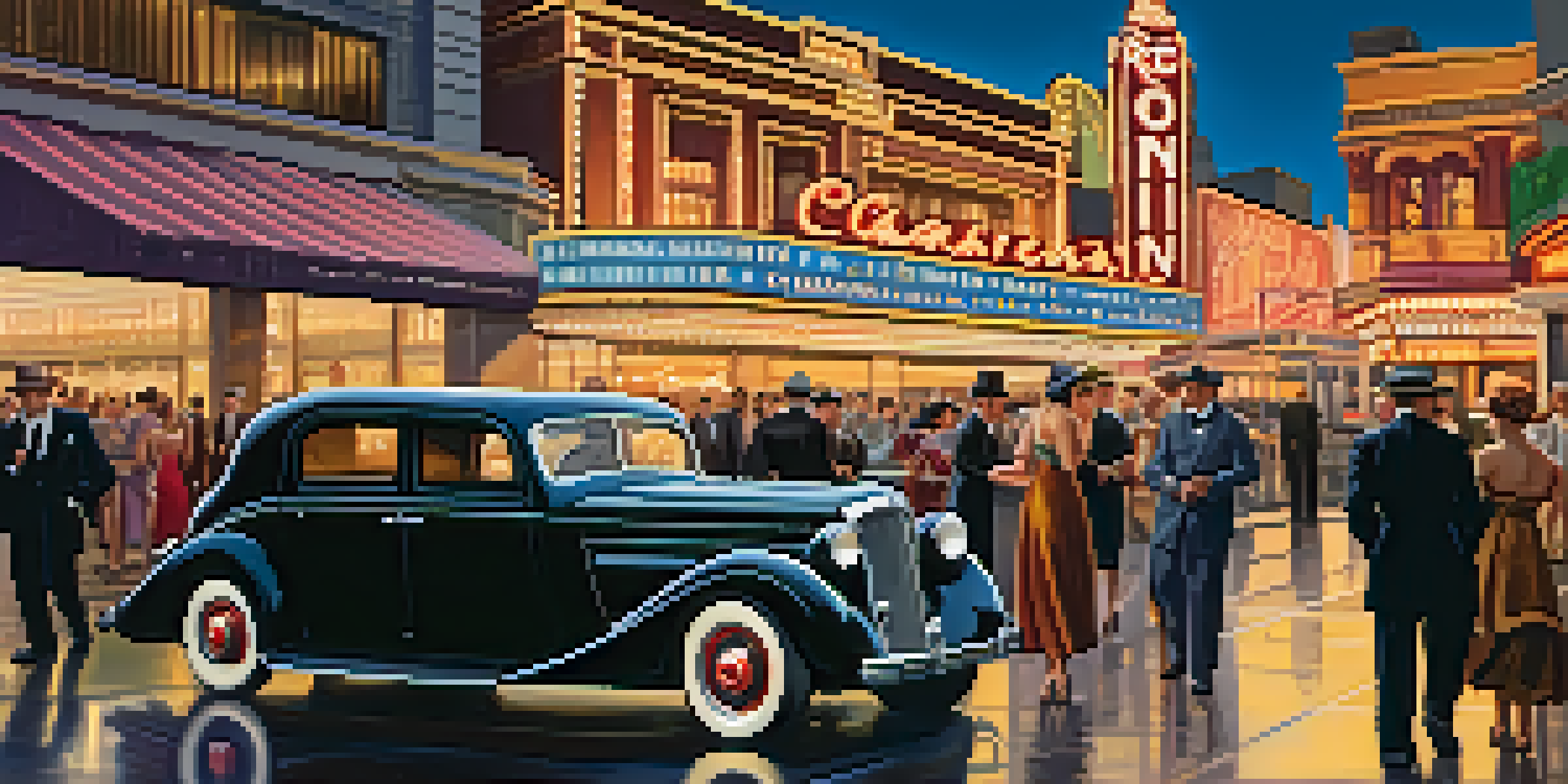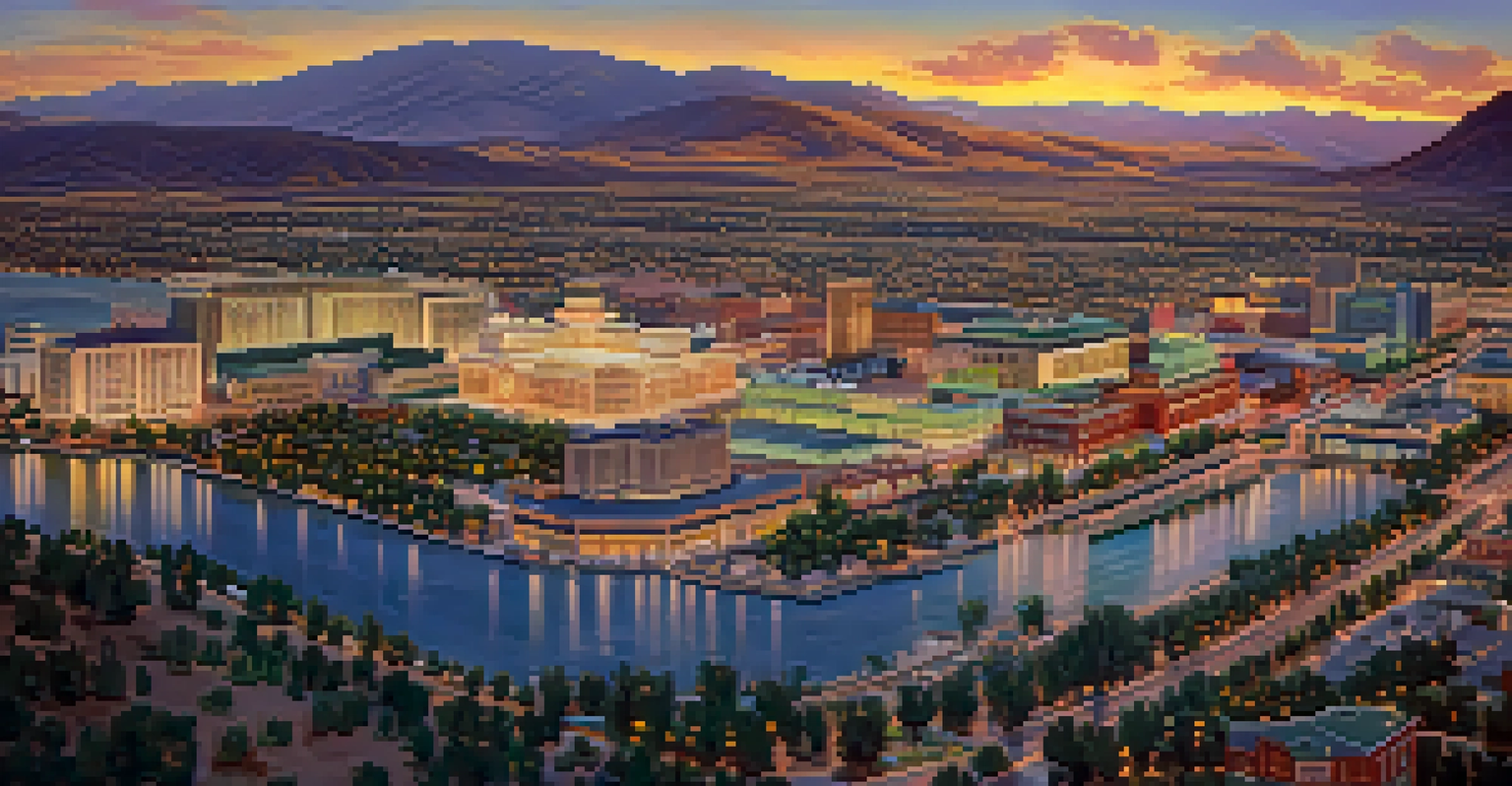The Influence of the 1931 Gambling Legislation on Reno

The Context of 1931: A Turning Point for Gambling
The 1931 gambling legislation emerged during a tumultuous time in American history, marked by the Great Depression. As people sought new ways to escape their hardships, Nevada recognized an opportunity to boost its economy through legalized gambling. This pivotal moment redefined Reno's identity, transitioning it from a quiet town to a bustling gaming hub.
Gambling is a very powerful tool for generating revenue for local governments and creating jobs in the community.
Before 1931, gambling existed in a gray area, often viewed with suspicion and limited in scope. The new regulations not only legalized gambling but also established a framework for its operation, attracting both investors and tourists. Reno, with its proximity to California and a reputation for entertainment, became an immediate beneficiary of these changes.
The legislation signaled a shift in societal attitudes toward gambling, as it began to be seen as a legitimate source of revenue. This acceptance laid the groundwork for Reno's future growth, positioning it as a key player in the burgeoning gaming industry. The town quickly adapted to its new role, with casinos popping up and revitalizing the local economy.
Reno's Transformation: From Small Town to Gaming Capital
With the passing of the 1931 law, Reno experienced a rapid transformation. The legalization of gambling attracted not only players but also entrepreneurs eager to capitalize on the new market. This influx of investment led to the construction of iconic casinos, drawing visitors from across the nation and beyond.

As Reno's reputation as a gambling destination grew, so did its infrastructure. Hotels, restaurants, and entertainment venues began to flourish, creating a vibrant atmosphere that catered to tourists. This boom not only provided jobs but also fostered a sense of community centered around the gaming culture.
1931 Legislation Transformed Reno
The 1931 gambling legislation marked a pivotal moment that shifted Reno from a quiet town to a thriving gaming hub.
Reno's transformation during this period was more than just economic; it reshaped its social fabric. The town became known for its nightlife and entertainment options, establishing itself as a must-visit location for those seeking both gaming and leisure. This new identity set the stage for Reno's evolution over the decades to follow.
The Role of Casinos in Reno's Economic Revival
Casinos became the lifeblood of Reno's economy following the 1931 legislation. They provided essential revenue for the local government and created thousands of jobs for residents. The influx of visitors not only boosted the gaming industry but also spurred growth in ancillary sectors like hospitality and retail.
The challenge lies in balancing the benefits of gaming with the social responsibilities that come along with it.
The economic impact of casinos was profound, as they attracted both tourists and business investments. This growth helped to stabilize the local economy, which had been struggling due to the Great Depression. As more casinos opened, they created a competitive environment that drove innovation and improved customer experiences.
Furthermore, the success of Reno's casinos set a precedent for other states considering similar legislation. It showcased the potential benefits of legalized gambling, paving the way for future developments in the industry. Reno's experience became a model for how gaming could transform a community economically and socially.
Cultural Shifts: Gambling Becomes Mainstream in Reno
The 1931 gambling legislation not only impacted Reno's economy but also contributed to cultural shifts within the community. As gambling became more accepted, it started to intertwine with the local lifestyle. Events, festivals, and promotions centered around gaming became commonplace, fostering a unique culture in Reno.
This cultural acceptance of gambling transformed how residents viewed leisure activities. It was no longer just a pastime but an integral part of community identity. Reno embraced its status as a gaming capital, with locals often participating in events and promotions that celebrated their town's legacy.
Casinos Revitalized the Local Economy
The influx of casinos following the legislation created thousands of jobs and revitalized various sectors of Reno's economy.
Moreover, this shift had a ripple effect on societal norms, with gambling becoming a part of everyday conversation. As families began to view gaming as an acceptable form of entertainment, the stigma surrounding it started to fade. This cultural evolution played a significant role in shaping Reno's future as a premier gaming destination.
Challenges and Criticisms of the Gambling Industry
Despite its successes, Reno faced challenges stemming from the rapid growth of the gambling industry. Issues like gambling addiction, crime, and the socio-economic divide became increasingly prominent. Critics voiced concerns over the impact of gambling on families and the community at large.
As the number of casinos increased, so did the need for regulation and oversight. The local government grappled with balancing the benefits of a booming industry against the potential downsides. This led to discussions about responsible gaming practices and the importance of support systems for those affected by gambling.
Reno's experience serves as a case study in the complexities of legalized gambling. While the economic benefits were undeniable, the challenges highlighted the need for a comprehensive approach that considers both the positive impacts and potential harms. This ongoing dialogue continues to shape the future of gaming in the region.
The Legacy of 1931 Legislation on Modern Reno
Looking back, the gambling legislation of 1931 laid the groundwork for what Reno is today. The city has evolved into a vibrant hub of entertainment, known not just for gambling but also for cultural events, dining, and outdoor activities. This diversification has helped to sustain Reno's relevance in a changing world.
Modern Reno has learned from its history, implementing measures to promote responsible gaming and support community well-being. The lessons from the past have informed current practices, ensuring that the benefits of gambling are maximized while minimizing potential harms. This proactive approach has helped maintain a positive image for the city.
Cultural Acceptance of Gambling Grew
As gambling became mainstream, it intertwined with Reno's community identity, fostering events and a unique gaming culture.
The legacy of the 1931 legislation is evident in Reno's ongoing evolution. As new trends in entertainment emerge, the city continues to adapt, blending its rich gaming heritage with contemporary attractions. This ability to evolve ensures that Reno remains a dynamic destination for visitors and residents alike.
Looking Ahead: The Future of Gambling in Reno
As we look to the future, the influence of the 1931 gambling legislation remains a crucial part of Reno's narrative. The landscape of gambling is changing with the rise of online gaming and sports betting, challenging traditional casinos to innovate. Reno is at a crossroads, where embracing technology could further enhance its status as a gaming leader.
The city is poised to take advantage of these trends by integrating modern technologies into the gaming experience. Smart casinos, mobile betting, and virtual reality experiences could attract a new generation of gamblers. This shift will require a careful balancing act to maintain the essence of what made Reno a gaming capital while adapting to new consumer preferences.

In navigating this future, Reno's ability to learn from its past will be essential. By fostering a culture of responsible gaming and community support, the city can ensure that it continues to thrive. The legacy of 1931 will undoubtedly influence Reno's trajectory, as it strives to remain a relevant and exciting destination in the ever-evolving world of gambling.